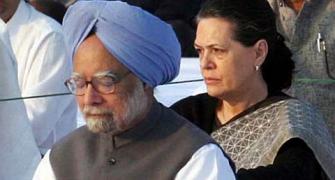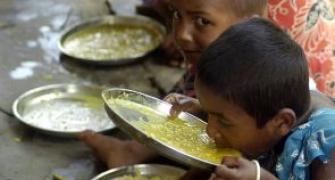The Congress will only be able to gain from the bill if its benefits percolate down to the people within the next eight months, says Anita Katyal
 Even as the ordinance on food security was formally promulgated on Friday, the Congress and the United Progressive Alliance government face three basic challenges: implementation of the mammoth scheme, hard-selling it as the party’s biggest pro-poor intervention in the run-up to the coming elections and to ensure that opposition-ruled states do not claim ownership of this programme.
Even as the ordinance on food security was formally promulgated on Friday, the Congress and the United Progressive Alliance government face three basic challenges: implementation of the mammoth scheme, hard-selling it as the party’s biggest pro-poor intervention in the run-up to the coming elections and to ensure that opposition-ruled states do not claim ownership of this programme.
Seen as a potential vote-catcher, the Congress party’s publicity managers got cracking even before the President had signed on the dotted line.
Having been pilloried for poor governance and corruption, the Congress and the UPA government is going out of its way to change the political narrative in its favour as it gears up for assembly poll in Delhi, Madhya Pradesh, Chhattisgarh and Rajasthan this year-end followed by the Lok Sabha elections in 2014.
Agriculture Minister K V Thomas and Congress communications department chief Ajay Maken addressed a packed press conference Friday afternoon to explain the salient features of the Food Security Bill.
They were also quick to point out that the Congress had fulfilled its election manifesto promise by bringing this bill, a point which will be highlighted in the coming months.
At the same time, Information and Broadcasting Minister Manish Tewari held an hour-long meeting with his officials to draw up publicity plans for the programme. Background material on the bill, prepared well in advance, has already been disseminated.
The coming months can be expected to witness a media blitzkrieg as the government’s various wings have been instructed to go out on a limb to publicise the bill.
The Congress will project the bill as party president Sonia Gandhi’s brainchild while her commitment to the aam admi and underprivileged sections will be underlined in full measure.
While publicising the positive aspects of the bill, the party and the UPA government will also have to fend off critics and opposition parties who have come down heavily on the ruling coalition for adopting the ordinance route. They have dismissed the legislation as a political gimmick.
Besides opposition leaders, Samajwadi Party chief Mulayum Singh Yadav, whose party is extending outside support to the UPA government, was critical of the bill, describing it as “anti-farmer.”
Disagreeing with this contention, Maken maintained that the bill will actually benefit farmers as the government will now be procuring larger amounts of foodgrains. More and more farmers will be brought under the ambit of MSP (managed services provider) operations which will encourage farmers to step up production.
Besides removing all these misgivings, the other big challenge before the Congress is to make sure that the party is able to draw full political mileage from this programme. This will be particularly tough in some opposition-ruled states like Chhattisgarh, Odisha and Tamil Nadu which are already distributing subsidised foodgrain.
Thomas and Maken explained that these existing schemes will continue but the state government will benefit as the Centre will now provide them foodgrain at far cheaper rates bringing down their subsidy bill.
Congress strategists also maintained that these schemes are not necessarily permanent as they could be discontinued if the party in power is voted out. However, the food security bill will make it binding on the states to continue the scheme as its people will be legally entitled to subsidised foodgrains.
However, Congress insiders admit that party cadres face an uphill task in convincing the electorate that the funds for schemes in these states are being provided by the Centre. A senior Congress leader agreed that it will not be easy to explain such technicalities to the common man. The Congress workers will necessarily have to work doubly hard to reach out to the people with the message that the “Right to Food” programme is their party’s brainchild.
The Congress had faced a similar problem when the rural job guarantee scheme was implemented. When several states took credit for this programme, the Centre rechristened it as the Mahatma Gandhi National Rural Employment Act, so that the Congress could claim its ownership. At the same time, the party also organised several workers’ conventions to exhort the cadres to oversee the functioning of the programme and market it as the party’s flagship scheme.
This tussle between the Centre and the states was also witnessed when the Pradhan Mantri Gram Sadak Yojana was implemented.
The Congress will only be able to derive political mileage from the Food Security Bill if its benefits percolate down to the people within the next eight months. Consequently, the implementation of this programme is critical.
Thomas explained that the bill provides six months to the states to identify beneficiaries in accordance to the guidelines provided by the Centre, streamline the public distribution system and put in place the necessary infrastructure to roll out the scheme.
The Centre believes the opposition-ruled states will find it difficult to delay the programme as it could boomerang on them. On the other hand, it will be easier to push the Congress-ruled states into implementing the scheme at the earliest.








